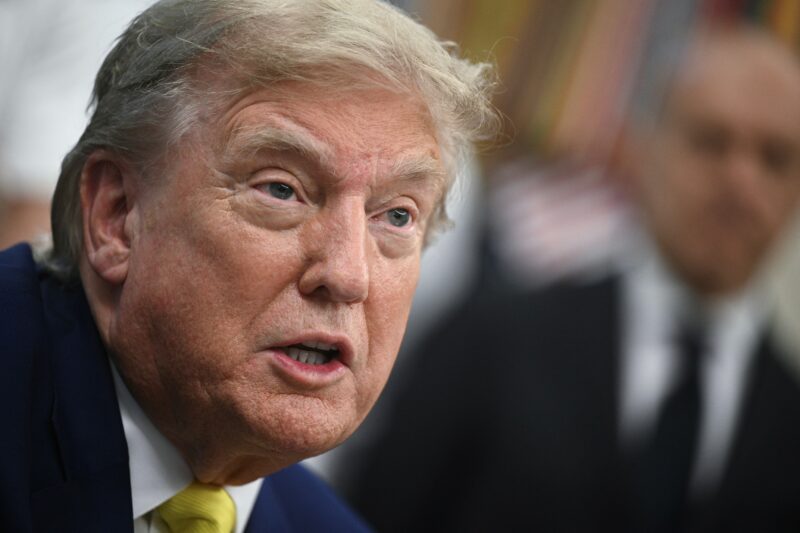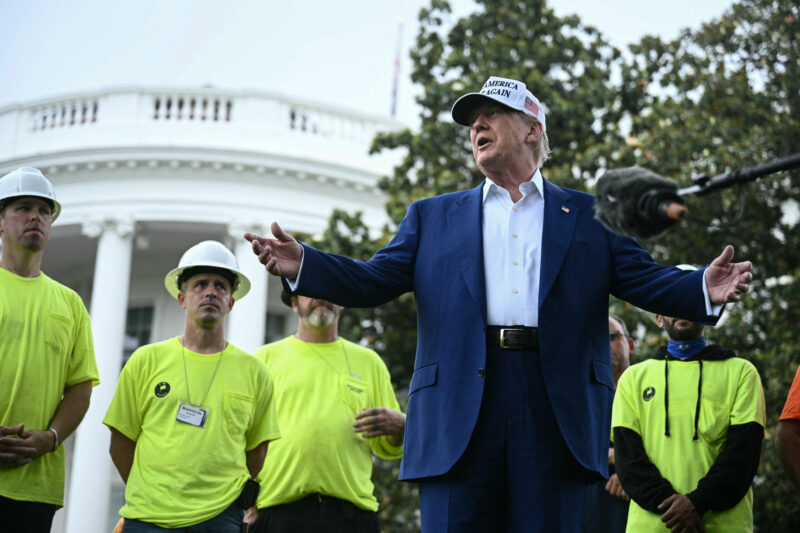Qatar-funded experts tell hostages’ relatives not to criticize Doha
A source who advised hostages' families said that the Richardson Center told them that ‘pressure on Qatar would be counterproductive because Qatar holds all the leverage.’

Alexi J. Rosenfeld/Getty Images
Hadas Kalderon (C) and families of hostages march to a rally outside Israel Defense Forces headquarters on December 16, 2023, in the Kirya area of Tel Aviv, Israel.
The Richardson Center for Global Engagement, which receives substantial funding from the Government of Qatar, advised the families of Israeli hostages held by Hamas in Gaza not to criticize the Gulf state, which is a major financial backer of Hamas.
The Richardson Center “promotes global peace and dialogue by identifying and working on areas of opportunity for engagement and citizen diplomacy with countries and communities not usually open to more formal diplomatic channels,” according to its mission statement. One of the ways it does this is to negotiate for the release of hostages, and was involved in the release of American student Otto Warmbier from North Korea and Princeton student Xiyue Wang, and worked with the family of basketball player Brittney Griner when she was imprisoned in Russia.
In multiple statements regarding the release of American hostages last year, the Richardson Center stated it “is greatly appreciative of our partners, including the Government of Qatar, and the many individuals who support and enable our work as a non-for-profit.”
In 2019, the center announced a “substantial investment in hostage recovery” from Doha. Richardson Center Vice President and Executive Director Mickey Bergman said at the time that “the funding provided by Qatar will allow us to expand our team, engage in more on the ground activities, and provide even greater support to families in their darkest hours.”
Doha has sought to make itself an essential player in the region, maintaining good relations with Washington – the Al Udeid Air Base in Qatar hosts 8,000 U.S. military personnel – while serving as a conduit to pariah states and terrorist groups, like Hamas, the Taliban, and others.
Qatar hosts Hamas’ political office, including leaders Khaled Mashal and Ismail Haniyeh, and has transferred nearly $2 billion. to the Palestinian terrorist group since it took over Gaza in 2007.
“This is what we can do that nobody else can do,” Qatari Foreign Ministry spokesman Majed Al-Ansari said to AFP last month.
This role goes against Israel’s war aim to destroy Hamas, in that if there is no Hamas, Qatar will lose an element of its power and leverage.
While the Richardson Center has not made any public statements about helping the Israeli hostages, JI saw a document instructing potential donors where to send funding to support the Israeli hostages. The center noted that it will not take any overhead fees from the donations.
Bergman also confirmed that the center is working “on behalf of families, at their request and at absolutely no cost to them. Beginning October 8th, we’ve been asked by an increasing number of families for help. We are currently working with many of the families.”
“Our only priority is the safe return of the hostages. Due to the sensitivity of the work, we are not able to comment on any of it,” he wrote.
Bergman, who is Israeli, reached out to the Hostages and Missing Persons Families Forum in October and came to Israel soon after, according to Emilie Moatti, the head of the forum’s diplomatic department. Moatti said that in addition to meeting with her team, Bergman held individual meetings with families.
“His authority gives [the relatives] more confidence,” Moatti said.
A source who advised hostages’ families said that the Richardson Center told them that “pressure on Qatar would be counterproductive because Qatar holds all the leverage.”
“It’s all a scam on the families, sadly,” the source told Jewish Insider, commenting on the advice. “The one lever not pulled in 10 weeks is pressure on Qatar.”
The Richardson Center also advised families ahead of their meetings with the Qatari ambassador to the U.S., the source said.
Bergman did not respond to questions about the relationship between Qatar and the Richardson Center, nor about what advice he gave the hostages’ families.
An expert who has known Bergman for over a decade spoke on condition of anonymity due to the sensitivity of the hostage issue. She said that if Bergman is advising hostages’ relatives not to criticize Qatar, she is certain he genuinely thinks it is the right thing to do. “It’s hard for me to believe that this is in his self-serving interest over funding,” she said.
Mitvim: The Israeli Institute for Regional Foreign Policies, suggested in a recent paper that Qatar may try to prolong hostage release talks to delay the diminishment of its regional influence.
Still, the Mitvim paper’s authors said that it is in Israel’s immediate interest during the war to continue “leveraging all of Qatar’s influence on Hamas in Gaza, despite the urge to cut ties over its support of terrorism.”
The Tikvah Forum, a hawkish alternative to the more prominent Hostages and Missing Persons Families Forum did not shy away from criticizing Qatar in a statement it made after Hamas broke the cease-fire with Israel earlier this month. The Tikvah Forum said that “massive pressure” on Hamas is the only way to free all of the hostages, and they demanded “a total war against Hamas and its supporters in Israel and abroad…mainly including Qatar, which is the problem that is igniting and supporting Hamas, not the solution.” A spokesperson for the forum would not say if any of its members sought the Richardson Center’s advice.
Seth Frantzman, an adjunct fellow at the Foundation for the Defense of Democracies, said “while it is imperative that the hostages be released as soon as possible, one should be wary of Doha’s role as both a host of Hamas and a mediator.”
“Hamas has benefited from being hosted in Qatar, seeking legitimization the same way the Taliban did via Doha in the past. It is essential that Qatar give Hamas the cold shoulder and condemn the group’s atrocities,” he added.
Asher Fredman, senior fellow at the Misgav Institute for National Security and Zionist Strategy, told JI that “Qatar’s ultimate goal is for Hamas to survive and continue to be an Islamist terrorist force in the region, so definitely calling out Qatar is the right thing to do.”
“Qatar is a negative actor that should be treated as such,” Fredman said. “The U.S. and Israel and all the actors…putting pressure on Qatar is the way to get them to take a more active role with regards to the hostages.”
Israeli Prime Minister Benjamin Netanyahu said in a press conference on Saturday night that Israel “has serious criticisms of Qatar, which you will eventually hear, but right now we are trying to complete the recovery of our hostages.” The comment came as diplomatic sources said Israel’s government authorized Mossad chief David Barnea to enter a new round of negotiations mediated by Qatar to free the hostages.
Days after Hamas’ massacre of Israelis on Oct. 7, Secretary of State Tony Blinken said in a press conference with Qatari Prime Minister Mohammed Al Thani that there can be no more “business as usual with Hamas,” but soon after that thanked Qatar for its “important assistance” in working to release hostages.
There has been little pushback from Israel’s government, other than from ministers who have little bearing on Qatar-related policy or threats to close Qatari news outlet Al Jazeera, while Israeli National Security Adviser Tzachi Hanegbi tweeted in the early weeks of the war that he is “pleased to say that Qatar is becoming an essential party and stakeholder in the facilitation of humanitarian solutions. Qatar’s diplomatic efforts are crucial at this time.”
The expert speaking on condition of anonymity said that the U.S. and Israel should be making demands of Qatar that they “choose sides” and no longer sponsor Hamas.
Advice given to their families “is important, but less so than actual government officials. They should be the ones responsible,” she said. “These poor people should not have to think about the global interests of aspiring regional players.”

































